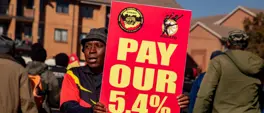Taxi industry vows crackdown on violence amid tensions with e-hailing services
Sara-Jayne Makwala King
20 August 2025 | 6:55SANTACO’s zero-tolerance pledge follows a spate of violence, which claimed the life of an e-hailing driver last week.

Picture: © Alexey Stiop /123rf.com
Africa Melane is joined by Dr Siyabulela Fobosi, a senior researcher at the UNESCO 'Oliver Tambo' Chair of Human Rights at the University of Fort Hare.
Listen below:
South Africa’s minibus taxi industry remains a vital public transport lifeline, yet ongoing violence and conflict with e-hailing services highlight challenges within the sector.
On Tuesday, South African National Taxi Council (SANTACO) President Motlabane Tsebe said it would be adopting a zero-tolerance approach to violence involving its members.
Tsebe promises that members found to be guilty of any violence will be expelled.
His comments follow last week’s killing of an e-hailing driver at Maponya Mall.
Fobosi is the author of the 2020 article ‘Fixing South Africa’s minibus taxi industry is proving hard’ for The Conversation.
He says the industry plays a crucial role in South Africa's public transport system, but admits things cannot continue as they are.
ALSO READ: 'This is criminality' - Santaco denies instructing taxi drivers to block private cars
"We can't continue living with the challenges which include unregulated operations, allegations of corruption, the unlicensed drivers and the disputes and violence."
- Dr Siyabulela Fobosi, UNESCO 'Oliver Tambo' Chair of Human Rights - University of Fort Hare
Fobosi highlights conflict between the taxi industry and e-hailing services as 'a major problem'.
"These conflicts have resulted in deadly consequences, as seen in the recent killing at Maponya Mall."
- Dr Siyabulela Fobosi, UNESCO 'Oliver Tambo' Chair of Human Rights - University of Fort Hare
Fobosi suggests that the government's role in the challenges facing the taxi industry has historically been reactive rather than proactive. He argues that this is the result of a lack of political will.
"... being selective in terms of addressing the problems in the public service sector and being selective in terms of only looking at the more formalised public transport sector."
- Dr Siyabulela Fobosi, UNESCO 'Oliver Tambo' Chair of Human Rights - University of Fort Hare
"The state has failed to regulate the industry due to a lack of investment in different sectors."
- Dr Siyabulela Fobosi, UNESCO 'Oliver Tambo' Chair of Human Rights - University of Fort Hare
ALSO READ: Taxi Peace Summit aims to 'clean the image of the taxi industry'
So what is the way forward for the industry and the challenges it faces, asks Melane.
Fobosi says the answer lies in greater oversight from the government.
"The government's failure to enforce labour laws continues to perpetuate the cycle."
- Dr Siyabulela Fobosi, UNESCO 'Oliver Tambo' Chair of Human Rights - University of Fort Hare
Scroll up to listen to the full conversation from Early Breakfast.
Get the whole picture 💡
Take a look at the topic timeline for all related articles.
Trending News
More in Local

20 September 2025 16:10
EFF says party’s fight against Operation Dudula is to protect the human rights of South Africans

20 September 2025 15:00
SA Navy honours three naval officers who died during a vertical transfer exercise off the coast of Kommetjie

20 September 2025 14:40
EFF lays criminal charges against Operation Dudula after the death of a sick child in Alexandra










